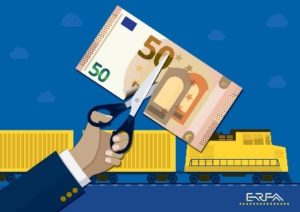Competition in Railways - International Railway Summit
Does competition benefit customers?
Carole took part as a speaker at the 6th International Railway Summit in Prague in a panel discussion addressing whether competition benefits customers. Carole represented the perspectives of the private and independent freight operator members of the European Rail Freight Association (ERFA).
The European Rail Freight Association (ERFA) is an association which represents private and independent railway companies from across Europe. ERFA aims to achieve the best conditions for a competitive railway sector. Our mission is to promote rail transport as a first and viable choice for customers, and to ensure full market opening of rail across all of Europe. ERFA’s objective is to represent the voice of new market entrants in Europe. We support the EU decision-making process with a focus on policy and technical affairs. Our focus is on generating growth for demand in rail services and shifting more goods onto eco-friendly rail.
We represent more than 1/3 of the rail freight market share.
ERFA’s existence and activities are based on this conviction: competition in a healthy environment benefits customers. Our members are competing between each other for customers because they are convinced that they can bring an added value to customers, and their continuous growth has demonstrated that they can.

Within ERFA, we favour competition as away to meet customer needs. European policy takes note that a monopoly situation fosters pricing distortion: limited customer orientation and unsustainable business models. Let’s take for instance the French situation audited in the Spinetta Report that concludes that the current SNCF business model has to be adapted and that competition has to be developed on the French market.

Competition and the existence of private operators on the market have many advantages. Among them, monopoly service providers will never have the same pressure to decrease prices, improve quality, innovate, as when they are competing with other companies for customers. Better quality creates pressure for higher performance. Also, better price drives down costs.
Moreover, we have in mind that innovation is beneficial to drive the development of superior products for the market. We think that information availability creates the climate for enhancing customer communication. We want customers to have the power to make choices: if a customer is unhappy with one Railway Undertaking, he has other options.
To conclude, competition in a healthy Market environment benefits customers; but healthy competition is still not the case in most EU countries today! In most EU countries one dominant market player, normally the state-owned incumbent, trounces the competition with the nearest, biggest competitor trailing far behind. This should be not the case if the right framework conditions were in place to support sustainable business models for freight. So yes, rail freight is open to competition today, but still not able to deliver the products needed by the market.